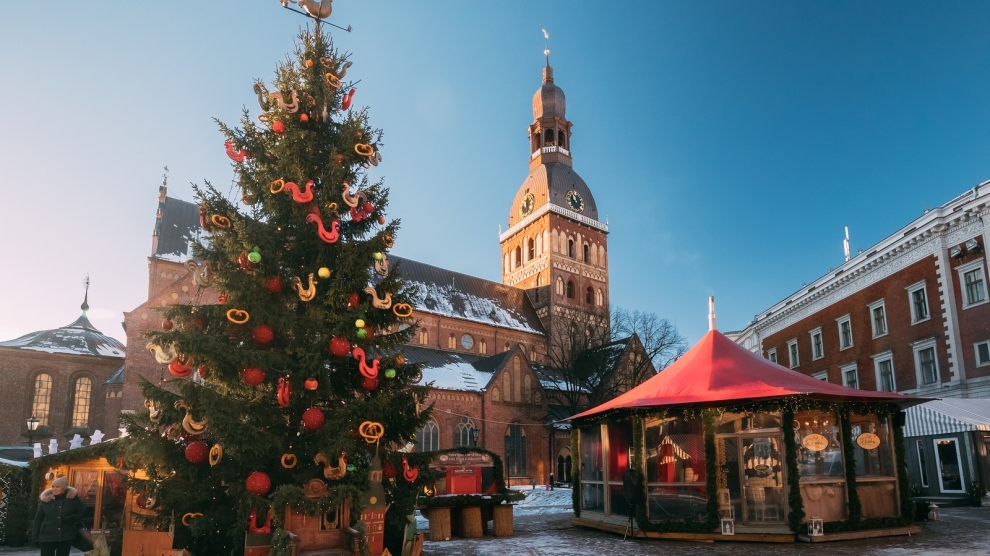I remember very well my first Christmas in Hungary. One of my colleagues had invited me to a Christmas dinner at his house. It was a cold and snowy day but as soon as I stepped into his home I was hit by the warmth of the fire and a wonderful smell of food. I asked if I could wash my hands. My host pointed me to a door. I almost screamed when I entered the restroom: two carp were happily swimming in the bathtub. Merry Hungarian Christmas, Claudia.
Hungary has plenty of Christmas traditions. Carp swimming in the bath is only one of them. As the main ingredient of the famous Hungarian fish soup, people used to keep carp in their bathtubs so that for December 24 they could enjoy the freshest soup ever. Today, most people buy the fish soup, or eat it at restaurants but sometimes, especially in the countryside, they like to keep traditions alive.
As for the annual pig slaughter, also very common in the Czech Republic and in Romania, older people remember that during their childhood slaughtering a pig was a holy ritual which had to be respected. When I was a child I used to wait for Santa Claus, with all my family members in the living room singing Christmas carols. I never thought that some children, far away from home, were running after a pig to kill it.
Then there was another tradition which, as a kid, I thought to be valid for everyone: Santa Claus coming in the night and leaving presents under the tree. In Italy, we used to decorate our Christmas trees on December 8, the Immaculate Conception, which is a national holiday celebrated through the whole country. Hungarians celebrate Saint Nicholas on December 6: children receive sweets but they wait until December 24 to decorate the Christmas tree so that Little Jesus can come and bring the presents. It’s nice to witness this religious and holy atmosphere, something that, unfortunately, is being lost in many parts of the world.
The Tree
“On the First day of Christmas my true love sent to me a partridge in a pear tree”, starts the English song The Twelve Days of Christmas”. The lyrics then go on listing all the gifts received over the Christmas holidays. Despite being an English song written in the 18th century, Latvians still hand out gifts for 12 days. As in many Western countries, Santa Claus brings the presents which will be put under the Christmas tree. Often, children have to sing songs or play instruments before opening them. I am glad I was not born in Latvia or I would have never opened a present since I don’t know either to sing or to play an instrument.
But the most ancient tradition in Latvia is actually the decoration of the Christmas tree. In 2010 Riga celebrated the 500th anniversary of the first ever Christmas tree. According to some sources, maybe not entirely verified, the first Christmas tree appeared in 1510 in Latvia in front of the House of Blackheads on Town Hall Square. Estonia also claims to be the home of the tradition. Regardless, in Latvia decorating the tree remains one of the most important parts of the holidays.
Grandfather New Year
In Italy, we used to clean our houses during the Easter holidays. There is a saying for very clean people: “Your house looks as clean as Easter.” Albanians like to clean everything during the Christmas holidays. The house should be perfect for the New Year.
In fact, Albania does not celebrate Christmas as much as it celebrates New Year’s Eve. Due to the Ottoman occupation first and the harsh communist regime later, Albania is not focused on Christmas. It is a national holiday, and trees are sold, but Christmas is nothing compared to January 1. Even Santa Claus comes on December 31 under the name of Baba Gjyshi Vitin i Ri, which means “Grandfather of the New Year”.
All About Food
Poland has one foot in tradition and the other in tomorrow. At no time is this more pronounced than during holiday meals. These time-honoured recipes for Wigilia, the Polish Christmas Eve celebration, feature many traditional touches than are unfamiliar in other European countries. The rose crescent rolls, for instance, use a jam made of rose petals and the Christmas Eve borscht is allowed to sour for 10 days at room temperature.
Poland is all about food. Christmas, as well as Easter, are culminating points of the Polish culinary year. Smells and aromas blended together create a strange symphony that excite the appetite and imagination. Some traditional Christmas delicacies can be bought ready-made, but they cannot compare to the dishes that are prepared according to recipes passed on from generation to generation.
A Sound of Joy
As a woman, it might also be interesting to spend the Christmas holidays in Romania. According to one old tradition, if a woman wants to be sure she will find a husband in the coming year she should sleep with a bar of soap and a comb under her pillow on Christmas night. So, single ladies of all over the world, book a flight to Bucharest.
But once there, don’t forget to keep your rubbish. It is considered bad luck to take out the trash on Christmas Day, as you are thought to be throwing away your good luck.
But surely the most attractive part of the Romanian holidays are the Christmas carols. Usually kids go knocking at every door to perform their songs. They don’t only sing. They dance, they wear costumes (often animal skins) and they wish everyone health and happiness. A sound of joy which can be heard in every corner of the country.

